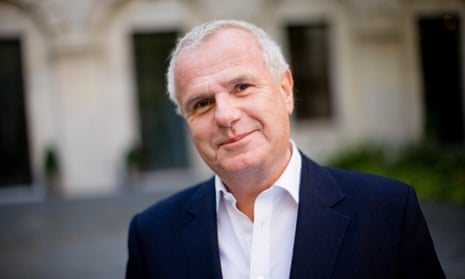Paul Myners, the City grandee and former Labour minister brought in to government to tackle the 2008 financial crisis, has died at the age of 73.
Regarded as an influential figure in both the square mile and politics for his time advising the former prime minister Gordon Brown on the historic bailout of the British banking system, Baron Myners, of Truro in the county of Cornwall, died in the early hours of this morning.
His family confirmed in a statement that Myners had “passed away peacefully” at Chelsea & Westminster hospital in London.
Adopted from a Bath orphanage by a Cornish couple at the age of three, he started as an inner city school teacher, then became a financial journalist for the Daily Telegraph before moving into finance with the storied London investment bank NM Rothschild.
Myners was chairman of the Guardian Media Group (GMG), publisher of the Guardian and Observer newspapers, between 2000 and 2008 when he stood down to take his ministerial post in Brown’s government as the global financial system was imploding.
The former prime minister led tributes to Myners, describing him as a “tower of strength” during the crisis.
“My thoughts are with Paul’s family,” said Brown. “After a successful career in finance [he] was persuaded in 2008 to enter public service and was a tower of strength, helping nationalise key banks and producing a plan to overcome the global financial crisis. His charitable work in his native Cornwall will be long remembered.”
Barely 20 days into his role as City minister, Myners was thrown into the deep end to help orchestrate Brown’s bank rescue, which led to the taxpayer taking multibillion-pound stakes in Royal Bank of Scotland and Lloyds Banking Group after its merger with HBOS.
Nick Macpherson, the former permanent secretary to the Treasury, said drafting in Myners had been an “inspired appointment” during the emergency. “He played a leading role in resolving the financial crisis. Brilliant. Mercurial. Irreverent. Full of commercial acumen. It was a privilege to know him.”
Carolyn McCall, the ITV chief executive who ran GMG while Myners was chairman, said he would be “greatly missed”.
“Paul was formidable with a brilliant brain, an entrepreneurial spirit and a prodigious work ethic. He didn’t suffer fools at all, was a tough taskmaster and had a wicked sense of humour. I loved working with him and learned so much when he chaired GMG.”
GMG chair Neil Berkett said: “We are saddened to hear of Paul Myners’ death. As chair, he led Guardian Media Group successfully during a period of great change in our industry.”
Earlier in his career, Myners had been chair and previously chief executive of the City fund manager Gartmore, where he made his name in finance after growing the firm into a multibillion-pound investment house. Under his stewardship, its funds grew from £1.2bn in 1985 to £75bn in 2001.
In 2000, he moved to positions as a non-executive director of several companies, including the chairmanship of Marks & Spencer during a tense period when the high street stalwart faced down a potential bid from the retailer Philip Green.
Stuart Rose, who Myners parachuted in as chief executive of M&S in 2004 to revitalise the ailing high street stalwart, said he had lost his best friend.
“He was a rare breed. Without overdoing it, how can I describe him? He really was a beacon in a sea of mediocrity,” said the Conservative peer, who is now the chairman of Asda.
“He stood out, he was a man of immense wisdom. Intellectually very strong, a self-made man who was humble and loyal to the core. In this world we’re surrounded by today in business and public life, he had a massive moral compass. He knew instinctively what was right and wrong and stood up for the little man.”
Myners refused to open formal talks over a sale of M&S when approached by Green, before the former Arcadia retail tycoon dropped his multibillion-pound bid for the company in 2004.
“He was irreverently funny. He could absolutely bring you to stitches, but he could be ruthless as well,” Rose said.
Myners was also influential in compiling a landmark government review into institutional investment and chaired the Low Pay Commission. He entered the House of Lords in 2008 after being made a life peer, and remained on the Labour benches until 2014, when he became a crossbench peer. He was appointed chairman of the UK arm of the international public relations firm Edelman in 2015, a role he held until his death.
“There are few people who bring such depth of knowledge and experience from the top of both the private and public sector, and Paul always did so with a strong social and moral conscience,” said Ed Williams, president of Edelman in Europe. “He also brought fun and laughter and was able to move effortlessly from plcs to pop culture. I wish to pay tribute to his amazing contribution to public life over many decades.”
Myners is survived by his five children, and five grandchildren. In a statement, the family said: “With great sadness we announce the loss of our beloved father Lord Paul Myners (1948-2022). He passed away peacefully in the early hours of this morning (Sunday) at Chelsea & Westminster hospital. He will be deeply missed and in our hearts forever.”
